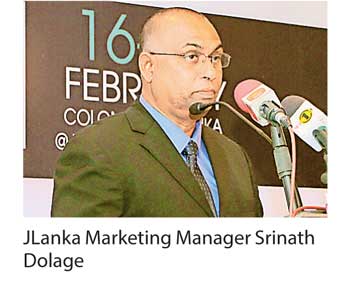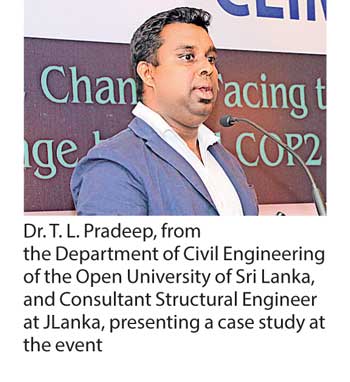Monday Feb 23, 2026
Monday Feb 23, 2026
Wednesday, 8 March 2017 00:00 - - {{hitsCtrl.values.hits}}
 The inaugural International Conference on Climate Change (ICCC) 2017 held in Sri Lanka concluded successfully, providing stakeholders a great platform to discuss and address the impact of climate change.
The inaugural International Conference on Climate Change (ICCC) 2017 held in Sri Lanka concluded successfully, providing stakeholders a great platform to discuss and address the impact of climate change.
The two-day conference hosted by the University of Colombo was co-organised by The International Institute of Knowledge Management (TIIKM) and JLanka, Sri Lanka’s pioneer in renewable energy, and one of the country’s leading advocates in mitigating climate change.
The forum, held from 16-17 February at The Kingsbury Hotel Colombo, saw a large gathering of over 100 local and international climate change experts, engineers, scientists, researchers, environmentalists and sustainability advocates across multi-disciplinary fields, exchanging ideas, discussing challenges, initiating solutions and new ideas to minimise impact, sharing knowledge, and also networking and investing time to drive future initiatives forward.
Dr. Scott Denning, famed Professor of Atmospheric Science from Colorado State University, USA, and Dr. Eleanor Milne, Affiliate Scientist from University of Leicester, United Kingdom and Colorado State University, USA, delivered keynote addresses at the conference. Dr. Erandathie Lokupitiya from the Department of Zoology and Environmental Sciences, University of Colombo chaired the event.
Technical sessions covered a wide range of topics varying from greenhouse gas emission predictions to food security, from biodiversity conservation to carbon accounting tools, all sessions providing comprehensive insight into the latest trending topics on climate change, global warming and its resulting outcomes.
Dr. Scott Denning took the stage once again with V.R. Sena Peiris, Visiting Lecturer, Mechanical Engineer, Director/CEO – NCPC, Sri Lanka, to facilitate a workshop on ‘The Role of Industry in Climate Change Mitigation’, which saw the participation of close to 150 invested industry stakeholders.
Dr. T. L. Pradeep from the Department of Civil Engineering at the Open University of Sri Lanka, and Consultant Structural Engineer at JLanka, also an expert in sustainable material and green construction, presented a use case scenario of a local enterprise successfully mitigating climate change with a JLanka solar solution.
Industries at large play a very important role in sustainability and climate change. Initiatives to introduce eco-friendly products and processes affect multiple chains of dependencies, from employees, their communities, and the economy at large.
JLanka, the industry leader for solar solutions in Sri Lanka, is driving the revolution of renewable energy consumption across the country. With over 2000 customers and a 40% market share in solar, JLanka contributes with more than 12MW of installed capacity, inclusive of its annual contribution of 13.6 GWh of energy to the national grid, as well as 5,400+ tons of CO2 emissions credited per year. The company has fully supported the public power-generating programme ‘Surya Bala Sangramaya’ (SBS), introducing tailor-made solutions, including large-scale industrial solar systems.
“When it comes to climate change mitigation, JLanka’s role is two-fold,” commented Srinath Dolage, Marketing Manager atJLanka. “As industry leaders we set benchmark standards in mitigating climate change, and we also wish to disseminate the knowledge that we have gained over the years on this subject. The International Conference on Climate Change 2017 was the perfect platform to serve this purpose. We were thrilled by the turnout and the resulting discussions at the event, and hope to continue with this momentum in future collaborations with our growing network.”
To further encourage and support local scholars and researchers of the subject, JLanka is currently evaluating all presented papers that addressed the challenges of adverse climate change effects at the conference, especially in the health and agriculture sectors. The company will announce the winner shortly, and financially support them through a monetary grant to implement the proposed project. 
